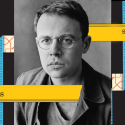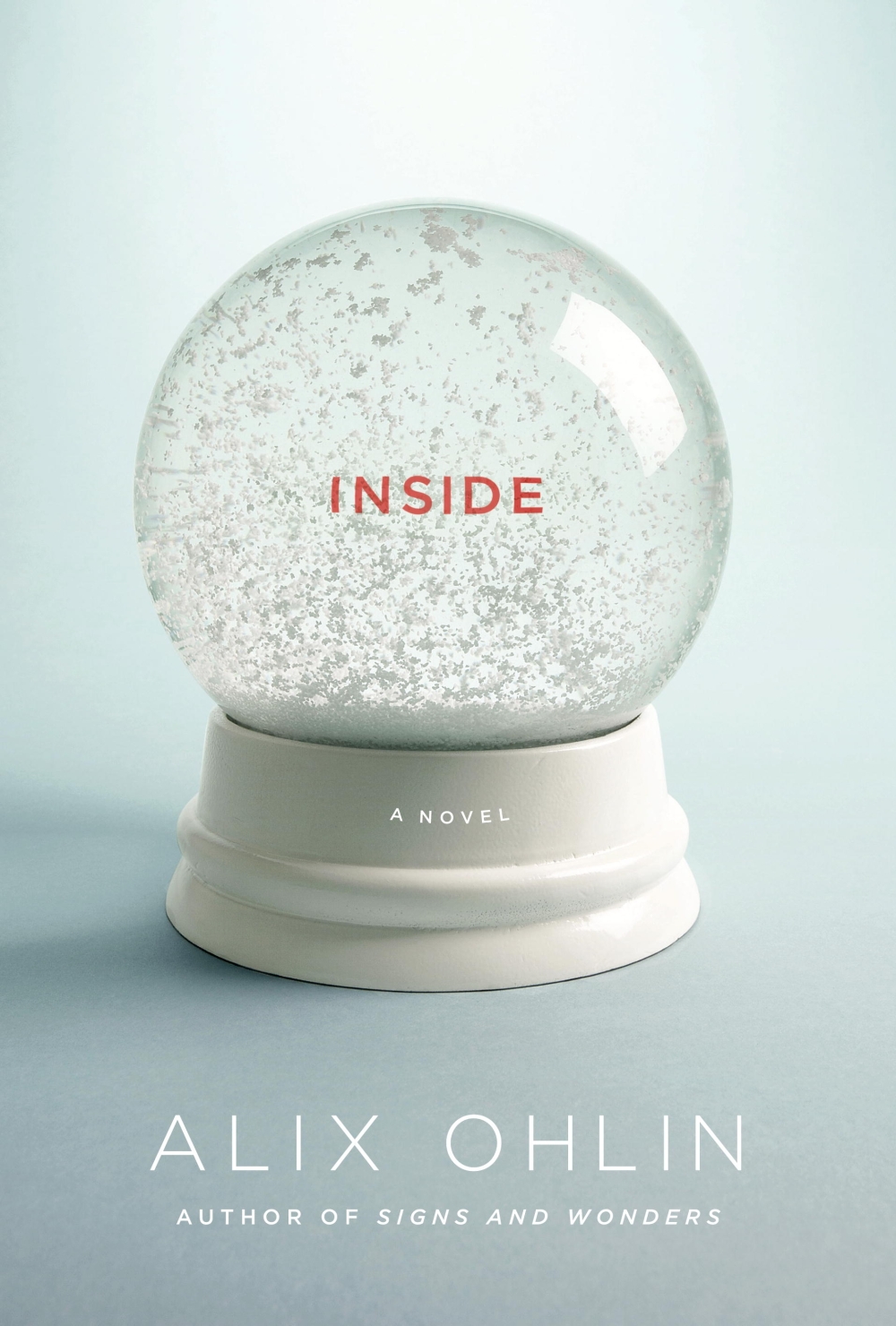 Joshua Cohen is a tad prolific. At 34 he has published eight books, four novels and four story collections. Adding to this feat is the size of some of the novels. His 2010 novel Witz is a veritable doorstop at 817 pages. His most recent, Book of Numbers (June 2015), is a bit shorter, clocking in at 592 pages. The novel has received general acclaim for its complexity, lyricism, and confrontation with the culture and influence of the Internet. As Mark Sarvas of the New York Times said of the novel: “its breadth, the ambition of its ideas and devices, confounds standard book review responses.”
Joshua Cohen is a tad prolific. At 34 he has published eight books, four novels and four story collections. Adding to this feat is the size of some of the novels. His 2010 novel Witz is a veritable doorstop at 817 pages. His most recent, Book of Numbers (June 2015), is a bit shorter, clocking in at 592 pages. The novel has received general acclaim for its complexity, lyricism, and confrontation with the culture and influence of the Internet. As Mark Sarvas of the New York Times said of the novel: “its breadth, the ambition of its ideas and devices, confounds standard book review responses.”
From Publishers Weekly:
The narrator, Joshua Cohen, is a struggling writer whose debut effort was inauspiciously launched on Sept. 10, 2001. Deciding to “earn better money… at the expense of identity,” he agrees to ghostwrite the memoir of another Joshua Cohen, referred to as “Principal.” Principal is the secretive founder of Tetration, a tech company that has developed a revolutionary search engine and seeks to “equalize ourselves with data and data with ourselves.” Speaking to his ghostwriter in the first-person plural he leisurely relates the genesis and evolution of Tetration while sprinkling in a mixture of ominous epigrams (“All who read us are read”), mystical musings, and “techsperanto,” the language of Silicon Valley. But Principal has another motive in sharing his story, one that forces his biographer to go into hiding, and offline, to complete his task. The novel maps the recent history of the Internet onto one of Western culture’s oldest stories, the plague-filled wanderings of Moses and his fractious band of Israelites journeying toward the Promised Land. This allegorical element imposes just enough order on a saga as sprawling and unruly as the Web.
Lately you may have noticed Cohen in the news for his novelistic experiment PCKWCK (check it out here). Cohen sat in front of a webcam five hours a day for five days, from October 12th to the 17th, writing a serialized novel (with illustrations by Leon Chang) whose aim was to be a reinterpretation of Charles Dickens’s The Pickwick Papers.
Cohen and I corresponded over email this summer and met in early September, prior to the PCKWCK experiment. We discussed Book of Numbers, writing, the Internet, and life in general as we smoked cigarettes on a bench at a Red Hook playground. What follows is a rough mashup of our digital and analog conversations.
– Jesse E. Sherwood
COLUMBIA JOURNAL
In the interest of full disclosure, I should tell you that I haven’t finished reading Book of Numbers yet, but I bought it and I’m reading it (along with vol. five of The Collected Short Stories of Philip K. Dick). You get what, three bucks off of that $28 cover price?
COHEN
I’m not sure what my percentage is. I read books, not contracts.
COLUMBIA JOURNAL
What are you reading?
COHEN
A pile by Pascal Garnier. Also, a few—but they’re more or less all the same—by Patrick Modiano.
COLUMBIA JOURNAL
Any good?
COHEN
You’ll have to read my review, in my column in Harper’s. Subscriptions are cheap.
COLUMBIA JOURNAL
How long have you been working at Harper’s?
COHEN
I’d have to go to the Internet to answer that. I wrote my first essay for them in 2006, 2005 maybe. But I’ve been doing the New Books column since, guessing, 2012. And then they fired me, and then they hired me again, and then they fired me again, and they hired me, etc.
COLUMBIA JOURNAL
Why’d they keep firing you?
COHEN
Because there’s always someone more famous they can hire.
COLUMBIA JOURNAL
Are you on tour now?
COHEN
It’s not much of a tour. Just a few dates scattered here and there, with returns to New York between each one.
COLUMBIA JOURNAL
Where are you now? Anything interesting happen whilst on the road?
COHEN
I’m in Portland, Oregon, now [in July]. The airport, PDX. Nothing interesting happening. Just wake, travel, read, sleep. I managed to make it to the wedding of friends, Justin Taylor and Amanda Bullock. Read Justin’s new book, with the not-quite-marriage-appropriate-title Flings.
COLUMBIA JOURNAL
How long have you known Taylor?
COHEN
I’ve known Justin a while. He’s a wonderful writer, probably the best, most natural storywriter of our cohort. Short stories are an economic artform, invented by the magazines of postwar America. Obviously people have been writing short fiction forever, obviously people have been telling tales forever, but many of the techniques you find in magazine stories were invented by editors, or at least codified and promulgated by editors. I can’t read such things without sensing the intervention, so when I say that Justin is a natural storywriter, I mean both that his writing sounds/looks/feels fluent and unforced and too that I can’t detect any compromise or pander. He knows how to breathe and spin.
COLUMBIA JOURNAL
Speaking of short stories: I just opened up the Philip K. Dick collection and there’s a quote by him that sort of relates to Numbers:
“How does one fashion a book of resistance, a book of truth in an empire of falsehood, or a book of rectitude in an empire of vicious lies? How does one do this right in front of the enemy?”
It seems that Dick is asking some of the questions brought up by Numbers, namely: What is the place of the novel/writer in our surveillance/digital age?
Are there any politics behind this? Is Numbers a book of resistance?
COHEN
Book of Numbers is a novel. It resists nothing except the attempt to politicize it.
COLUMBIA JOURNAL
So purely “art for art’s sake” then? In that vein do you find Dick’s politicization of art to be regressive? Something old fashioned that Orwell could get away with but today looks quaint or presumptuous?
COHEN
Art for art’s sake. And capitalism for capitalism’s sake. And socialism for socialism’s sake. Let me make what I make, for God’s sake. Also, I like Orwell. Or I like him better than Dick.
COLUMBIA JOURNAL
What about the simple tyranny of online in competition with the novelist? Aren’t writers facing the overarching rule of online content?
COHEN
It’s no competition. No contest. Online won. Just like TV won. And radio before that. And print journalism, even earlier. As long as literature keeps losing, it’ll survive. Remember what S.Y. Agnon said to Bellow: English is over—get your books translated into Hebrew, that way you’ll ensure that they’ll last.
COLUMBIA JOURNAL
So if literature won, that’s it? That victory would be its death knell?
COHEN
It’s not like when Dickens wrote about bad factory working conditions, or bad orphanage living conditions, those problems were promptly remediated. Writing isn’t action. It doesn’t end wars, or even fight the battles too well. It merely registers dissent. It tells a future that knows better that someone knew better too, back then. If winning’s your aim, leave the desk.
COLUMBIA JOURNAL
Going back to Numbers: Have you see Ex Machina? I was reminded of Principal in the character of the Google-like-mastermind in the film that creates the machine.
COHEN
Sure. But that character is a lot older than online. The tradition of the American eccentric businessman, the robber baron or media CEO crank. Think of William Randolph Hearst. Then think of Hearst becoming Charles Foster Kane… To make Principal I studied the models as much as I studied their fictionalizations. Howard Hughes, for example: there’s a lot to be gleaned from the bios, but just as much, at least for my purposes, to be found in how he’s been interpreted onscreen—Tommy Lee Jones v Leo DiCaprio…
COLUMBIA JOURNAL
As I read, I am finding that Numbers seems concerned with the Jewish/American culture/experience. I wonder what your thoughts are about this excavating and examining of one’s cultural identity and the sort of erasure of identity, or hyper-identity the Internet provides us.
COHEN
Online has become a replacement culture, superseding our previous identifiers. In theory, at least, everyone online can now claim the world—all the world in all its fullness—as inheritance. In practice, of course, this isn’t the case, and the broad bandwidth available becomes diffused in narrowing subcultures, or in censored, surveilled, monetized, or otherwise manipulated dead-ends. Still, the idea seems to be: we’re starting over—technology has made, or can make, equals of us all. My question has been: what’s lost? Or, specifically, what cultural specificity has been lost?
COLUMBIA JOURNAL
Can you expand on online being “a replacement of culture”?
COHEN
I’m afraid of losing what’s been important to me: (the delusion of) difference, exceptionalism, the individual, the parochial.
COLUMBIA JOURNAL
All very American traits, wouldn’t you say?
COHEN
I would. But also very Jewish traits too.
Online seems to me to be the great leveler—it betrays the secrets of the cult. Everyone now can go to a site and find out the secret handshakes of the Masons. Vietnamese teens can stay current with American black slang. The hidden has become unhidden—you don’t have to work for the codes anymore, you don’t have to live for them. You can be in, or of, the underground—just like that, snap of the fingers. This type of access shames what we call or used to call mainstream culture, which goes flowing along, and seems both toxic and timid by comparison. The way that mainstream culture discusses the digital underground seems to me as quaint and foolish as those stretches of turn of last century fiction in which neurotics strolled along the riverbank debating whether to address each other with the formal or informal pronoun.
COLUMBIA JOURNAL
What’s the place of the novel in that?
COHEN
I’m hoping that the novel becomes the repository of the new secrets, the true secrets. You want to bury something? You want to make sure that outsiders never find the true seclused wisdom of your tribe? Write it down, write it in a book—there’s nowhere safer.
Seriously: the novel should contain things that can’t be found anywhere else. It should contain—magic, and danger. You’re asking a reader to spend days, weeks, months, money—money. You’re asking to annex a stranger’s mind—and so to make that stranger an intimate.
COLUMBIA JOURNAL
David Foster Wallace said that writing, and especially the novel, is “an exchange between consciousnesses.” A sort of direct conversation between two minds. This is something you can’t get in any other facet of life. Do you agree?
COHEN
Let’s say I agree. But literature is a peculiar artform. Obviously there are cultural differences and historical differences in the way we experience music, and in the way we experience visual art. Certain religions don’t like depicting the faces of their prophets or gods, or they have certain ideas with regard to music being used strictly as the vessel of prayer. But ultimately we all have ears, we all have eyes, we can come to our own conclusions. One man’s blasphemous Allah portrait is another man’s cartoon, one man’s chant is another man’s cocktail party background muzak. Literature, however, contains a technical dimension. We can see and listen to everything, but we can’t read everything. Put a page in Turkish in front of me and I’m helpless. Or a Korean poem: teach me how to pronounce the words, phonetically, teach me how to draw the letters, by rote, and still, I’m clueless. Even if you take that Turkish, or Korean, and translate it into English, or into another language I can deal with—even if you swear on the graves of your ancestors that it’s the greatest translation in the world, done by the greatest translator in the world, still—it’s not the thing—it’s not the original. I’m not referring to contexts, but to materiality. Literature is the only artform whose dissemination requires a complete alteration of its materials. And it’s that particularity—or that re-particularity—that I’m interested in. This technical dimension creates—shoot me for saying this—a community. It creates—shoot me again—a family. To participate, you have to learn, you have to discern. As the shrinks say, you have to work on your relationships. My relationship to Hungarian is my relationship to Peter Nadas is to my relationship to his translators: Imre Goldstein into English, Christina Viragh into German. Literature, then, in its widest sense, commands our participation like no other media. It makes demands that become a life.
COLUMBIA JOURNAL
So these barriers–say barriers of translation or non-translation–are good? They’ll always be there?
COHEN
Always. Autotranslate will never scale those walls. And anyway, why should we want it to? Those walls, which have been the cause of so much misunderstanding and strife, have also ensured the survival of the species. That post-Biblical prophetic ideal, which holds that when the messiah comes we’ll all once again speak the same language—that seems like a nightmare to me. At least, it doesn’t seem like an Eden. The fate of the workers of the Tower of Babel should be celebrated. Imagine a single language that has to encompass everything that every language has now—every concept, every nuance. It would contain so much it would cease to be a language, it would cease to be knowable—just babble.
COLUMBIA JOURNAL
Okay. Time for the classic questions. Are you working on anything now?
COHEN
A novel. Israel, New York, real-estate, and militancy.
COLUMBIA JOURNAL
When did you start writing? Did you have a conscious thought of: “I’m going to be a writer?”
COHEN
Why? Or, why is that a question? It seems so data-driven, so digital: Why’d you click on this as opposed to this? Why did you select this as opposed to that? As if I had, or felt I had, any options. As if the world had been studying me since birth, in order to generate an algorithm that would present me with my choices—with the idea that I’d pick one, and that my picking of one would hone the world’s ability to offer such choices to others, and to sell us all supplementary products—laptops and cigarettes and whiskies, for writers—to aid our processes. Let’s avoid defining ourselves. Let’s plead the fifth and our unconscious.
COLUMBIA JOURNAL
So, is there truly a definition of a writer?
COHEN
Gods want to make matter. Magicians, or alchemists, want to change matter. And the scientists want to classify, or categorize, matter. As a writer you should want to be, or you should want to try to be, all three. You can always be a scientist, if you’re lucky you can be a magician or alchemist. Few, very few, become gods.
COLUMBIA JOURNAL
If you could pick a career, what would you be interesting in doing besides writing?
COHEN
I’d read—I’d be a reader. I’d study.
COLUMBIA JOURNAL
So a professor?
COHEN
More like a student. On scholarship. In a dorm. With a meal-plan.
COLUMBIA JOURNAL
Favorite writers?
COHEN
Vinnie Musetto.
COLUMBIA JOURNAL
What’s a typical writing day like for you?
COHEN
Seven days a week, all day. Drink at night. Rinse, repeat. And then we die.




